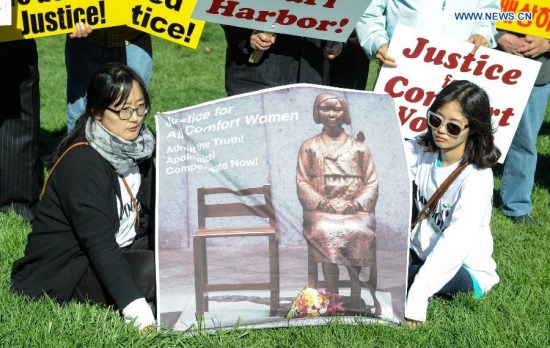
Protesters hold signs in front of Capitol Hill as Japanese Prime Minister Shinzo Abe pays a visit to White House in Washington D.C., capital of the United States, April 28, 2015. Nearly 200 people held signs and shouted slogans in a protest against Abe's handling of history issues, demanding the Japanese leader to unequivocally apologize for his country's wartime crimes here on Tuesday. (Xinhua/Bao Dandan)
The U.S. government should convey to Japanese Prime Minister Shinzo Abe that the mutual defense treaty requires cessation of all its "provocative behaviors," including denying the existence of "comfort women," former U.S. Congressman David Wu said Tuesday.
In an article posted on his personal website (www.davidwu.us), Wu said the U.S. response to Abe's series of irritants, ranging from comfort women to constitutional revision in a region still raw from World War II, "should be both subtle and strong."
"Through the most nuanced means of communication, we should convey to the Abe Government that our mutual defense treaty requires cessation of all its provocative behaviors, including denying that comfort women existed, revising or reinterpreting Japan's peace constitution, or visiting controversial sites sure to incite South Korea, China, and much of the rest of Asia," Wu wrote, adding Japan should also hold unconditional talks with China about the dispute over the Diaoyu Islands (called Senkakus in Japan) in the East China Sea.
Wu made the remarks while U.S. President Barack Obama held talks at the White House with Abe, who is on a state visit to the United States. At a joint press conference on Tuesday, Abe once again ducked a media question about "comfort women," a euphemism for the women forced into sex slavery by the Japanese military during the war.
Rather than offering a clear apology, Abe only said he is " deeply pained to think about the comfort women who experience immeasurable pain and suffering as a result of victimization due to human trafficking."
In January, Abe even delivered a speech to Japan's Diet that criticized the passages about "comfort women" in a McGraw-Hill high school textbook published in the U.S.
"We see Japanese revision of what happened to 'comfort women' as a matter of history and atonement in one particular instance, but in Asia, it foreshadows a frightening resurgence of Japanese nationalism affecting all countries in the area," wrote Wu, who was a U.S. Representative from 1999-2011.
Abe's attitude toward history, his efforts to break the shackles of the Pacificism Constitution in order to seek re- militarization, and his visit to a shrine that worships a dozen of A class Japanese war criminals, have strained Japan's ties with its neighboring countries, including China and South Korea.
"In order to exercise responsible American leadership and maintain regional stability, we must look at this one tragic issue and the many other related international events in that context, and also with a historical view that reaches back at least a century," he wrote.
On the Diaoyu Islands dispute, Wu noted that it was Japan's actions of nationalizing the islands that touched off the current furor between Japan and China.
The dispute has raised the risk of unintended conflict that could involve the United States, whose future role, as well as the regional peace, "depends up a successful resolution," he warned.
















































